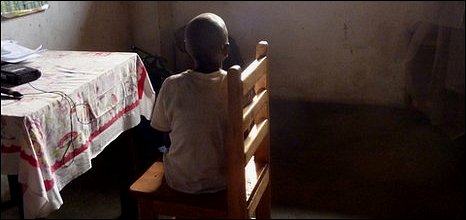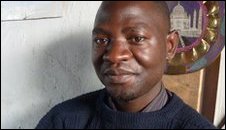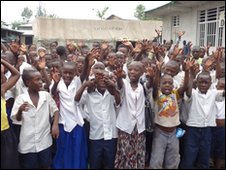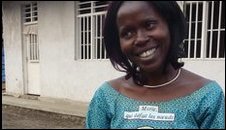BAK
JF-Expert Member
- Feb 11, 2007
- 124,790
- 288,005
By Mike Thomson
Today programme


12 year-old, Henri, which is not his real name, points at a large fresh looking scar on his midriff.
"People accused me of sorcery and my mother believed them," he says.
"Look, here on my stomach. She tried to kill me with a knife. It really hurt and I cannot understand why my mother did it."
Henri, who is now being given help by a children's charity, had been playing outside his home in Goma, eastern Congo, when the accusations began.
His eyes begin to water as he remembers pleading with his mother, telling her that the claims were completely untrue. Not that this made any difference.
"She threw me out of the house and told me to go away," he says.
Henri was then forced to live on the streets until charity workers convinced his mother that the allegations were untrue.
Growing problem
His is just one of a fast growing number of children accused of sorcery to come to the attention of Unicef's head of child protection in Congo, Alessandra Dentice.
"Children accused of witchcraft is unfortunately one of the major increasing child protection issues in the country," she says.


 Even some government officials believe in sorcery
Even some government officials believe in sorcery

Antonie Famber, Lawyer
Unicef's latest available statistics show that around one hundred cases of child sorcery allegations were referred to them in 2008 in the North Kivu province of Eastern Congo alone.
That number increased nearly fivefold to 450 in the same area last year.
Alessandra Dentice believes this may be explained by a growing awareness of the problem that has led to more reports rather than more cases.
But, she says, recent events in violence-plagued Eastern Congo might also explain the rise.
"This is a country where is no social cohesion any longer, there is no sense of community, no sense of family," she says.
"So, whenever anything happens at family or community level it is very easy for them to blame someone who is powerless and seems to have no rights."
Ms Dentice went on tell me how serious sorcery allegations can be for the children concerned.
"A lot of these children are beaten up or burnt. Unfortunately it is very common," she says.

 The head of the authority beat me with a stick and told me to say that I was a sorcerer. He forced me to say it. People were waiting outside to kill me
The head of the authority beat me with a stick and told me to say that I was a sorcerer. He forced me to say it. People were waiting outside to kill me

Jean
"I have just received this morning a report about a girl of 12-years-old who has been burnt because she was accused of witchcraft."
The Anglican Bishop of Bukavu, Josue Bulambo Lembelembe, is also very concerned by the apparent increase in sorcery allegations against children here.
"It only takes somebody in a family to fall ill and a child can be accused of sorcery," he says.
"Particularly if the youngster accused lives on the street. Then they point to him or her and say they caused the illness or other problem."
Death threat


Not far across Goma, I approached the offices of the charity, Childrens Voice.
Having heard that I was coming, more than 200 youngsters, standing in long neat lines, burst into song as I drove through the gates. In charge was the charity's local Director, Monossay Bodween Odette.
"We found many of these children on the streets without parents or any kind of support," she says.
"When children accused of sorcery of sorcery are abandoned on the streets life is very hard for them. People throw stones at them and many get badly hurt.
"That is why we go from house to house telling people not to listen to claims of child sorcery. We know that if our message fails to get through, some children will die."
It is here that I met 14 year-old, Jean, though I have been asked not to give his real name because of past threats against him. A tall sullen looking boy, Jean seems nervous and withdrawn.
But when I ask him to tell me about the witchcraft accusations against him he sits up straight and begins to tell me his story.
It all started, he says, after he went to see a Nigerian horror film about zombies.
"In this movie one person was raising the dead with a stick. I was with a friend and we went to a cemetery to play and try and act out the movie," he says.
"But when my friend saw me doing this he ran away and accused me of being a sorcerer to his parents."


 We know that if our message fails to get through, some children will die
We know that if our message fails to get through, some children will die

Monossay Bodween Odette, Children's Voice
Jean goes on to tell me that his friend's parents came to his grandparents house where he was living and told them that he was a sorcerer and would have to be burned.
Then, he says, his grandparents gave him a beating before taking him down to the offices of the local authority.
"The head of the authority beat me with a stick and told me to say that I was a sorcerer. He forced me to say it. People were waiting outside to kill me," he says.
Jean was then brought before a local priest who confirmed that he was a sorcerer.
It was only after the Children's Voice charity visited his grandparents and warned them that making witchcraft allegations against children is now illegal, that the matter was finally dropped.
But the existence of a recently introduced law under the Child Protection Code is one thing. Enforcing it can be quite another, according to local lawyer, Antonie Famber.
"The trouble is that most people here still believe in witchcraft so this makes the law very hard to enforce," he says.
"To make matter worse even some government officials believe in sorcery themselves. Take the case of a colleague of mine who is also a lawyer. He knows that the law does not recognise sorcery be he has accused his own children of witchcraft."
But Unicef's, Alessandra Dentice says the new law, which took eight years to get on the statute books and carries a maximum penalty of three years jail, is helping .
She believes that it has helped make people take a current radio and television campaign seriously and may also have prompted more people to report accusations made.
Not that such legal threats are making everyone here contrite.
12-year-old Henri, who revealed how he was stabbed by his mother after neighbours accused him of sorcery, told me how she responded after accepting that he was not guilty after all.
"She didn't say sorry to me. She didn't say anything."
http://www.bbc.co.uk/local/http://www.bbc.co.uk/sn/https://www.jamiiforums.com/#blq-nav-links-inner

Today programme


12 year-old, Henri, which is not his real name, points at a large fresh looking scar on his midriff.
"People accused me of sorcery and my mother believed them," he says.
"Look, here on my stomach. She tried to kill me with a knife. It really hurt and I cannot understand why my mother did it."
Henri, who is now being given help by a children's charity, had been playing outside his home in Goma, eastern Congo, when the accusations began.
His eyes begin to water as he remembers pleading with his mother, telling her that the claims were completely untrue. Not that this made any difference.
"She threw me out of the house and told me to go away," he says.
Henri was then forced to live on the streets until charity workers convinced his mother that the allegations were untrue.
Growing problem
His is just one of a fast growing number of children accused of sorcery to come to the attention of Unicef's head of child protection in Congo, Alessandra Dentice.
"Children accused of witchcraft is unfortunately one of the major increasing child protection issues in the country," she says.




Antonie Famber, Lawyer
Unicef's latest available statistics show that around one hundred cases of child sorcery allegations were referred to them in 2008 in the North Kivu province of Eastern Congo alone.
That number increased nearly fivefold to 450 in the same area last year.
Alessandra Dentice believes this may be explained by a growing awareness of the problem that has led to more reports rather than more cases.
But, she says, recent events in violence-plagued Eastern Congo might also explain the rise.
"This is a country where is no social cohesion any longer, there is no sense of community, no sense of family," she says.
"So, whenever anything happens at family or community level it is very easy for them to blame someone who is powerless and seems to have no rights."
Ms Dentice went on tell me how serious sorcery allegations can be for the children concerned.
"A lot of these children are beaten up or burnt. Unfortunately it is very common," she says.



Jean
"I have just received this morning a report about a girl of 12-years-old who has been burnt because she was accused of witchcraft."
The Anglican Bishop of Bukavu, Josue Bulambo Lembelembe, is also very concerned by the apparent increase in sorcery allegations against children here.
"It only takes somebody in a family to fall ill and a child can be accused of sorcery," he says.
"Particularly if the youngster accused lives on the street. Then they point to him or her and say they caused the illness or other problem."
Death threat


Not far across Goma, I approached the offices of the charity, Childrens Voice.
Having heard that I was coming, more than 200 youngsters, standing in long neat lines, burst into song as I drove through the gates. In charge was the charity's local Director, Monossay Bodween Odette.
"We found many of these children on the streets without parents or any kind of support," she says.
"When children accused of sorcery of sorcery are abandoned on the streets life is very hard for them. People throw stones at them and many get badly hurt.
"That is why we go from house to house telling people not to listen to claims of child sorcery. We know that if our message fails to get through, some children will die."
It is here that I met 14 year-old, Jean, though I have been asked not to give his real name because of past threats against him. A tall sullen looking boy, Jean seems nervous and withdrawn.
But when I ask him to tell me about the witchcraft accusations against him he sits up straight and begins to tell me his story.
It all started, he says, after he went to see a Nigerian horror film about zombies.
"In this movie one person was raising the dead with a stick. I was with a friend and we went to a cemetery to play and try and act out the movie," he says.
"But when my friend saw me doing this he ran away and accused me of being a sorcerer to his parents."




Monossay Bodween Odette, Children's Voice
Jean goes on to tell me that his friend's parents came to his grandparents house where he was living and told them that he was a sorcerer and would have to be burned.
Then, he says, his grandparents gave him a beating before taking him down to the offices of the local authority.
"The head of the authority beat me with a stick and told me to say that I was a sorcerer. He forced me to say it. People were waiting outside to kill me," he says.
Jean was then brought before a local priest who confirmed that he was a sorcerer.
It was only after the Children's Voice charity visited his grandparents and warned them that making witchcraft allegations against children is now illegal, that the matter was finally dropped.
But the existence of a recently introduced law under the Child Protection Code is one thing. Enforcing it can be quite another, according to local lawyer, Antonie Famber.
"The trouble is that most people here still believe in witchcraft so this makes the law very hard to enforce," he says.
"To make matter worse even some government officials believe in sorcery themselves. Take the case of a colleague of mine who is also a lawyer. He knows that the law does not recognise sorcery be he has accused his own children of witchcraft."
But Unicef's, Alessandra Dentice says the new law, which took eight years to get on the statute books and carries a maximum penalty of three years jail, is helping .
She believes that it has helped make people take a current radio and television campaign seriously and may also have prompted more people to report accusations made.
Not that such legal threats are making everyone here contrite.
12-year-old Henri, who revealed how he was stabbed by his mother after neighbours accused him of sorcery, told me how she responded after accepting that he was not guilty after all.
"She didn't say sorry to me. She didn't say anything."
http://www.bbc.co.uk/local/http://www.bbc.co.uk/sn/https://www.jamiiforums.com/#blq-nav-links-inner
